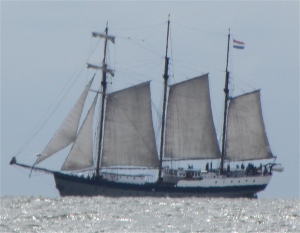 Distant Tall Ship in the Ijsselmeer |
As per usual, just as we were about to slip our final line two German boats came out in front of us. As we followed them out, we cast our eyes across to the train station. A number of long trains stood motionless and the station was deserted. Once out in the Ijsselmeer, we set a course due north to the Kornwerderzand sluis. In the distance a three-masted tall ship under sail headed north too. As we waved to Stavoren on our starboard side, we weaved amongst a patch of fishing pots. Despite the Dutch public transport system being on strike today, the Enkhuizen - Stavoren ferry was still operating. We spotted the leaning tower of Hindeloopen as we travelled up the coast, a delightful small town we had visited on an earlier trip.
Rex was in a different world of his own. For some inexplicable reason he had a moment of clarity and looked under the cooker. With a beaming smile he retrieved the missing torch. He had recalled I had inspected the engine the previous day, and suspected I had placed the torch on a ledge under the cooker while I replaced the step which covered the engine. I offered profuse apologies for having misplaced the damn thing in the first place. I watched him perform cartwheels around the deck, praising the heavens as he proclaimed he had seen the light. I cast a worried expression in his direction hoping he wouldn't burst into song. When he feels a song coming on and he pushes his lips out and starts strutting as he impersonates Mick Jagger, beware.
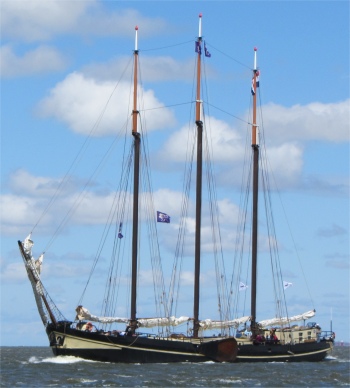 Tall Ship in the Waddenzee |
A three-masted vessel approached us and carved a groove in the water as it passed by, closely followed by a high speed patrol boat. When we were travelling up this stretch of water two years ago, Rex had just injured his back and was in agony. He had time to dwell on that as we slowly fought against the wind towards our goal.
As we approached Harlingen, one of the large ferries that served the Frisian Islands appeared out of the harbour. We quickly dashed into the large outer basin, the Voorhaven. A swift left turn brought us up to the Tsjerk Hiddessluizen, one of the locks that connected the Friesland canals to the Waddenzee. The locks derived their name from Tjerk Hiddesz de Vries, an admiral who was killed in 1666 during a sea battle against England. Once negotiated, we passed through into the Van Harinxmakanaal.
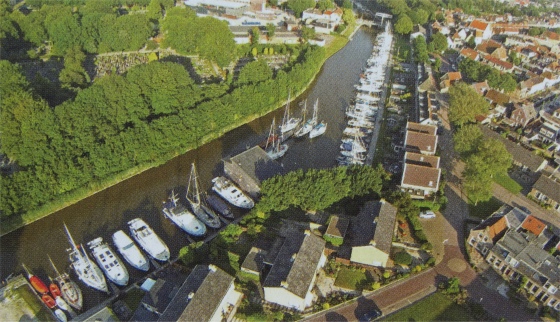 HWSV Marina |
We motored down the line of boxes, found 51 was our only option, and Rex expertly took Duonita in while I looped the stern ropes around the posts at the entrance to the box. I then sprinted to the bow to sort out the bow ropes.
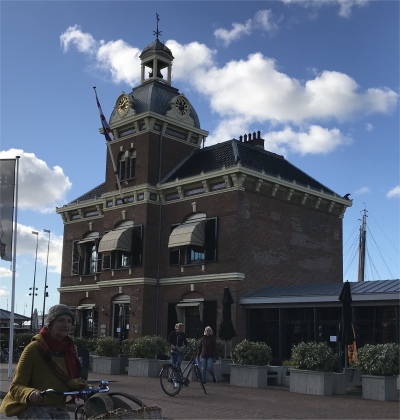 't Havenmantsje |
Once safely moored, I trotted off to the harbour master to pay our dues. Two years previously, a friendly chap called Willem was the harbour master. He had been kind to us and given us discounts during our two week stay. "Can we pay now for one night and we'll pay for any extra if we stay over, please? We should already be on your database." "No problem," replied the harbour master, who we later discovered to be Frank. "That will be 14.25 Euros for the night. You will need 50 cent pieces for showers, electricity and water. I will give you some in the change. Oh, the WiFi code is on the receipt, but you won't need it because our WiFi is not working. We had problems with the company who installed it a year ago, they are a shit company. Perhaps it will be fixed later in the season."
"Does Willem still work here?" I asked. "No, he left a year ago. He enjoyed working here, but he has a young family and needed to be working all year round, so he returned to being a carpenter. I enjoy working here too, but I have no family or responsibilities," he chuckled.
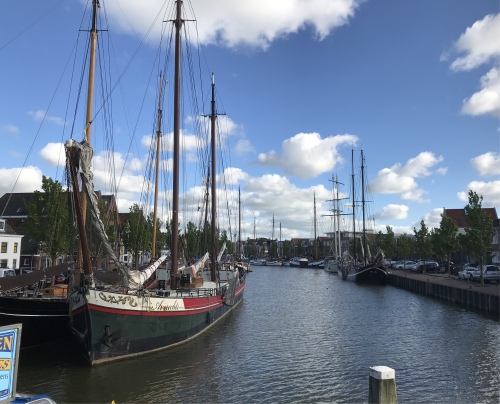 Zuiderhaven |
Willem Barentsz was born on the island of Terschelling off the Friesland coast of the Netherlands. He became the pupil of Petrus Plancius (Peter Platevoet), a theologian-cartographer whose sermons are often said to have been lessons in geography and astronomy.
In the late 16th century, the Dutch had an interest in the Orient, though at the time it seemed dangerous to contest the Portuguese monopoly of the route around the Cape of Good Hope. In 1595 Amsterdam merchants, undiscouraged by the English failure to find a Northeast Passage 40 years earlier, decided to resume the search. The Town Council of Amsterdam purchased and outfitted two small ships, captained by Jan Rijp and Jacob van Heemskerk, to search for the elusive channel under the command of Barentsz.
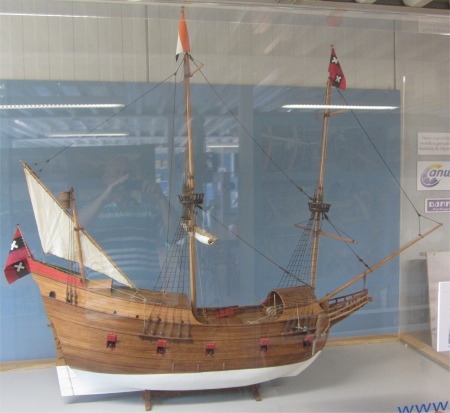 Model of the Ship Barentsz Would Have Sailed In |
The ships returned to Bear Island on 1st July. Here, anxieties over possible entrapment by ice resulted in a disagreement between Barentsz and Van Heemskerk on one side and Rijp on the other. They agreed to part ways, with Barentsz continuing northeast, while Rijp headed due north to resume exploration of Spitsbergen. Barentsz reached Novaya Zemlya on 17th July, previously discovered but not explored to its northern limit. Barentsz and Heemskerck rounded the northernmost point, naming it Hook of Desire, and sailed eastward, at first believing, from the open water encountered, that they had discovered the Northeast Passage. By November, however, the ice had grown thick and it finally imprisoned the ship. Barentsz and Heemskerck were 81°N at their highest latitude, beyond any point previously reached. Still close to Novaya Zemlya, they realised that they must build a solid shelter ashore in order to survive. They made one of logs and driftwood and moved into this 7.8x5.5m "Safe House" in October.
Dealing with extreme cold, the crew realised that their socks would burn before their feet could even feel the warmth of a fire, and took to sleeping with warmed stones and cannonballs. In addition, they used the merchant fabrics aboard the ship to make additional blankets and clothing. The ship bore salted beef, butter, cheese, bread, barley, peas, beans, groats, flour, oil, vinegar, mustard, salt, beer, wine, brandy, hardtack, smoked bacon, ham and fish. Much of the beer froze, bursting the casks. Proving successful at hunting, the group caught 26 Arctic foxes in primitive traps, as well as killing a number of polar bears. By 8th November, Gerrit de Veer, the ships carpenter who kept a diary, reported a shortage of beer and bread, with wine being rationed four days later. In January 1597, De Veer became the first person to witness and record the atmospheric anomaly known as the Novaya Zemlya effect.
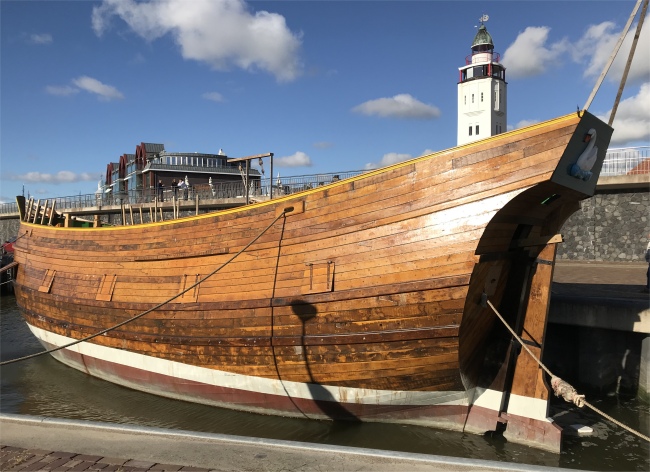 Reconstruction of Barentsz Ship |
In the 1870s European ships visited "Safe House" and found it partially caved in by snow. Objects left there by the Dutch explorers are in the Rijksmuseum in Amsterdam.
Back to the present, the museum we sought was still there, though closed at this late hour. However the site of the reconstruction had been levelled. "That's a shame," said Rex, "I wonder if it was eventually launched or scrapped because of lack of funds."
A young chap with his dog was ambling over the cobbled stones in our direction. I approached him, asked if he was local, and on learning he was enquired as to if he knew what happened to the ship. "It's just over there," he replied, pointing further along the promenade. I thanked him, we proceeded on and found the beautifully varnished boat floating in a small basin. It still needed to be fitted out and masts erected, but we were pleased to see it in its next stage of construction.
As we wound our way back into town, we had chance to reflect on the town's history. Harlingen is one of the original eleven cities of Friesland, connected by canals used in the long-distance ice skating event called "Elfstedentocht." You can visit these cities on skates if the ice is thick enough in the winter. The town was founded in 1243 near the site of the town of Grayn, which was engulfed by the sea in 1134. The harbour of Harlingen, which was formerly a considerable trading town, still exports Frisian products and imports coal, timber and other industrial raw materials. In the harbour area are shipyards, fish-processing plants, woodworking factories and works producing building materials. From the town, ferries cross to the islands of Vlieland and Terschelling, and the harbour is linked with Leeuwarden by the Van Harinxmakanaal.
Naturally we found a bar in Voorstraat, the main street, to enjoy a beer outside. Some folk were eating food there, so we checked the menu. Rex decided on prawn cocktail as a starter, while I opted for soup of the day, and we both chose oven baked cod for our main course. I went into the bar/restaurant to order. There were clearly only two people working in the establishment: the waiter and a "chef". I approached the waiter, "Can I order some food, please?" An affirmative answer came back. "Can I order the prawn cocktail, please?" I asked. "No, no prawn cocktail!" "Ah, what is your soup of the day?" "No soup!" Hmmm...... "OK, can I order two oven baked cod, please?" "No, no baked cod today!"End of conversation. We finished our beer and left.
Instead, we headed to the Eetcafe Nooitgedagt (aka Blue Hand Restaurant) where we had eaten before. It was originally a wine warehouse dating from 1647, and many of the details of that time are still visible in the decor. The food in this place is excellent, the only criticism is that the portions are large. I enjoyed a whole sea bass, and Rex devoured a chicken.
As I paid the bill, two elderly Dutch fellows standing at the counter asked if an item on the counter was mine. "No, nothing to do with me," I replied. "Are you English or German?" asked the younger of the two gents. "English." "Where are you from?" "East Anglia, Ipswich," I replied. "Oh, I used to race on the River Deben in November. That was 55 years ago," said the elder of the two. Just then Rex came up to join us. He had been standing freezing outside, expecting me to appear immediately after I had paid the bill. We shared a genial chin wag with the fellows, the younger had just returned from Spain. I discussed our plan to head up through the Kiel Canal, then onto Denmark and Sweden. "I have sailed across the Göta Canal between Stockholm and Gottenburg," piped up the elder chap. "I'm aware of that canal, but it's very expensive," I exclaimed. "Ha, but he has plenty of money," laughed the younger man. We enquired after good stopping off points along the belt of Frisian Islands, and the elderly bloke recommended Borkum. We parted company and the two wished us fair winds. That rounded our evening off fairly well, and knowing we would be up by 6am, we had an early night.
